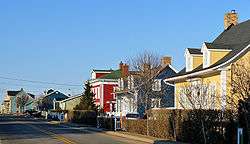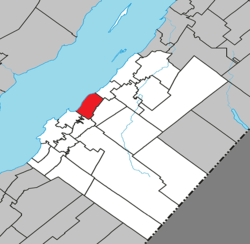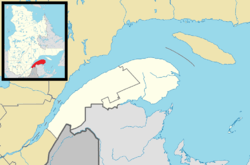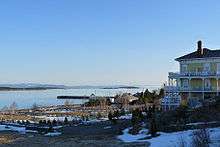Kamouraska, Quebec
| Kamouraska | ||
|---|---|---|
| Municipality | ||
 | ||
| ||
 Location within Kamouraska RCM | ||
 Kamouraska Location in eastern Quebec | ||
| Coordinates: 47°34′N 69°52′W / 47.567°N 69.867°WCoordinates: 47°34′N 69°52′W / 47.567°N 69.867°W[1] | ||
| Country |
| |
| Province |
| |
| Region | Bas-Saint-Laurent | |
| RCM | Kamouraska | |
| Constituted | April 25, 1987 | |
| Government[2] | ||
| • Mayor | Claude Langlais | |
| • Federal riding |
Montmagny—L'Islet— Kamouraska—Rivière-du-Loup | |
| • Prov. riding | Côte-du-Sud | |
| Area[2][3] | ||
| • Total | 145.50 km2 (56.18 sq mi) | |
| • Land | 43.51 km2 (16.80 sq mi) | |
| Population (2011)[3] | ||
| • Total | 589 | |
| • Density | 13.5/km2 (35/sq mi) | |
| • Pop 2006-2011 |
| |
| • Dwellings | 388 | |
| Time zone | EST (UTC−5) | |
| • Summer (DST) | EDT (UTC−4) | |
| Postal code(s) | G0L 1M0 | |
| Area code(s) | 418 and 581 | |
| Highways |
| |
| Website |
www | |
Kamouraska is a municipality on the south shore of the Saint Lawrence River in the Bas-Saint-Laurent region of Quebec, Canada. It is part of the Regional County Municipality of Kamouraska. It has been named one of the top 20 most beautiful villages in the province of Quebec, and the municipality is a member of the Most Beautiful Villages of Quebec Association.
The name "Kamouraska" comes from an Algonquin word meaning "where rushes grow at the water's edge".
History
The area was first settled in the late 17th century. In 1674 it was the Seigneury de Kamouraska, a constituent of the Gouvernement de Québec (fr). There is a long tradition of eel fishing here and an interpretive centre on eel fishing is located in the village.
Geography
There are salt marshes along the river and there is an ecological reserve near the village. The marsh provides habitat used by birds for nesting and during migration. Cliffs along the river provide nesting habitat for peregrine falcons, cormorants and great blue herons. Seals can also be seen in the river here. At certain times of year, the mosquitoes found in the marshes can be particularly aggressive.
The village can be reached via Autoroute 20. Route 132 travels through the village.

Municipal council
- Mayor: Richard Préfontaine
- Councillors: Dany Bossé, Michel Dion, Michel Lavoie, Pascal Morneau, Gilles A. Michaud, Hervé Voyer
Notable people from Kamouraska

Kamouraska has been the home of some important people in Quebec and Canadian history: the author of the French lyrics to "O Canada," Adolphe-Basile Routhier, was a judge of the Superior Court and lived there from 1864-1891 and the second verse of the "O Canada" reflects his love for Kamouraska ("Sous l'œil de Dieu, près du fleuve géant, Le Canadien grandit en espérant").
Anti-Catholic preacher Charles Chiniquy was born in Kamouraska in 1809.
The Member of the Quebec Legislative Assembly for Kamouraska electoral district, René Chaloult (1901-1978), was the single most important lobbyist for Quebec having its own flag, the fleur-de-lis, which was recognized by the government of Maurice Duplessis in 1948.
Kamouraska was also the location of the 1839 murder of Louis-Pascal-Achille Taché. The event inspired Anne Hébert's 1970 novel Kamouraska, which was made into a film in 1973 by Claude Jutra.
Kamouraska was also the hometown of Marie-Louise Meilleur, who went on to become the oldest person in the world in 1997-1998; she lived to 117 years of age.
See also
References
External links
| Wikimedia Commons has media related to Kamouraska, Quebec. |
 |
La Malbaie Saint Lawrence River |
 | ||
| Saint-Denis-De La Bouteillerie | |
Saint-Germain | ||
| ||||
| | ||||
| Saint-Philippe-de-Néri | Saint-Pascal |
